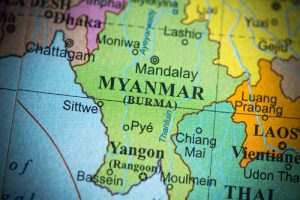
U.S. Sen. Todd Young (R-IN) is among a bipartisan group of senators who want to impose sanctions on military officials from Burma for their human rights abuses against their own people.
“America’s national security interests and humanitarian principles demand that when ethnic cleansing, crimes against humanity, and genocide occur that the United States boldly and clearly call them by name and seek to hold the perpetrators accountable,” Sen. Young said in a Dec. 4 statement released with U.S. Sens. Ben Cardin (D-MD), Dick Durbin (D-IL), Marco Rubio (R-FL) and Jeff Merkley (D-OR).
The senators are leading a U.S. Senate effort seeking targeted sanctions and travel restrictions on senior Burmese military officials who the United States Holocaust Memorial Museum on Dec. 3 charged with being responsible for the atrocities against the Rohingya, the Muslim minority population of Burma.
“The Burmese military’s campaign against the Rohingya, especially the attacks of August 2017, have been deliberate, systematic and widespread,” said Lee Feinstein, a member of the Holocaust Museum’s governing council and chairman of its Committee on Conscience, which advises the genocide prevention work of the museum. He noted that more than 700,000 Rohingya have been forced from their homes following decades of systematic discrimination and dehumanization.
“For the sake of the remnant community of Rohingya still in Burma and those threatened with being returned, we hope this announcement prods action,” Feinstein said about the brutalities made against the Rohingya.
The museum’s statement immediately sparked more action by Sen. Young and his colleagues.
“As one of the first members of Congress to label the Rohingya crisis a genocide, I am encouraged by the Holocaust Museum’s analysis and conclusions,” Sen. Cardin said. “Our hope is that such a designation will induce meaningful action by the international community to realize justice and accountability for the Rohingya.”
Sen. Cardin on Nov. 29 also sponsored the Burma Human Rights and Freedom Act of 2018, S. 3696, which has 16 original cosponsors, including Sens. Young, Durbin, Merkley and Rubio.
S. 3696 would support democracy and human rights in Burma, among other provisions, according to the congressional record. The senators said that S. 3696 also would prohibit certain military cooperation with the Burmese military until the U.S. State Department and the U.S. Department of Defense could certify that officials have stopped the violence.
Additionally, S. 3696 would support economic and security sector reform and encourage Burma’s successful transition of power to a civilian government, according to a summary of the bill released this week by the senators.
The bill first was introduced on Nov. 2, 2017 by U.S. Sen. John McCain (R-AZ), who before his death in August was chairman of the U.S. Senate Armed Services Committee, and Sen. Cardin, previously ranking member of the U.S. Senate Foreign Relations Committee. They had introduced S. 2060 in response to the wave of atrocities carried out by the Burmese government against the Rohingya in August 2017.
The newly introduced S. 3696 has been referred for consideration to the Senate Foreign Relations Committee.



